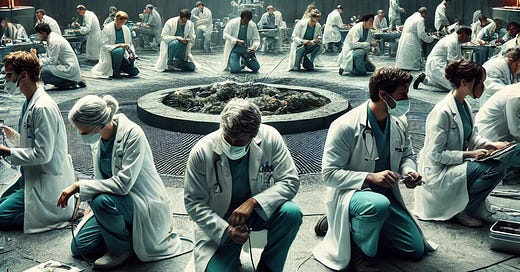In The Hunger Games, a greedy capital keeps the districts in line by playing a zero-sum death game with their children. The Center for Medicare and Medicaid Services annually does something very similar, in very slow motion. We get to cheer for winners, but a mathematical formula called the sustainable growth rate (SGR) makes it impossible to have a rational conversation about what should happen in healthcare.
Let's talk frankly about what has happened in healthcare. Center for Medicare and Medicaid Services set the base rate for all physicians and associated healthcare services. The cost of healthcare has gone up dramatically, and to be clear, that's because of the bloat in administration and the endless increase in the cost of drugs thanks to pharmacy benefit managers, their revenue by an 8.8% combined annual growth rate. I have prior articles on PBMs backing this up. I also have articles on private equity illustrating their disruptive role in the healthcare ecosystem.
CMS has to make a budget. And they have to make it theoretically “sustainable.” Does that mean the amount for drugs every year and payments to administrators? Hell no. We only just this year were able to negotiate on ten drugs. It’s like a firing squad, and you negotiate for one gun full of blanks! These cost increases must come out of somebody's pocket—those somebodies are doctors. CMS prices the relative value unit. All physician services are some multiplier of this relative value unit. It doesn't matter what kind of doctor you are. You get paid less, by some amount, that gets argued about every year. Because they built a decrease in physician reimbursement every year, there's a fight about that catastrophic decrease every year, so they decrease it a little bit.
There are competing priorities in any given federal budget, particularly for healthcare. They're trying to solve other problems. Newsflash: they won't. Because they're doing is just paying more money to Pharmacy Benefit Managers every year, because they price the drugs, and those Pharmacy Benefit Managers are wholly owned subsidiaries of the managed blah blah blah blah blah blah.
However, every year, we have an open comment period. We can also chime in on what we think about the proposed changes. There are some exciting—theoretically—proposed changes this year.
I'm not excited. I'm going to tell you why. Then, you can leave an open comment about it. By law, the Center for Medicare and Medicaid Services and all federal agencies must read every comment submitted and every open comment before finalizing the final rule. So, the more you can get your friends, particularly their Medicare beneficiaries, to leave open comments supporting a better world, the more seriously they have to take your perspective.
Here is my perspective: I don't want to settle for dumber crumbs anymore, ineffective treatments, or more money going to industry for ineffective treatments. We're on the verge of turning digital therapeutics and mental health into yet another boondoggle.
Now, in fairness, they've already been a boondoggle. We've already had therapeutics, which developed technology to treat patients with disorders, primarily addiction problems. There is additionally the proposal this year to pay for two important changes. Or theoretically important changes.
I think one of these changes is vastly more important than the other. One of these is already through! There is funding for 200 additional residency spots nationally, and 100 must be dedicated to psychiatry. This change increases the number of psychiatry graduates annually by just under 33%. This change doesn't hit meaningfully for at least four more years because that's how long it takes to train a psychiatrist.
The proposal also includes paying for digital therapeutics in behavioral health only. I suggest we do not support the proposal as written. There are currently codes for remote patient monitoring and suggested codes for physicians for remote patient monitoring (RPM). RPM has been a giant scam. Qua HHS:
This scam involves signing up Medicare enrollees for remote patient monitoring (RPM). Legitimate RPM involves using medical devices such as scales, glucose monitors, blood pressure cuffs, cardiac rhythm devices, and other equipment to remotely monitor for anomalies in patients with chronic medical conditions. This new treatment is beneficial for those whose condition might deteriorate quickly, where monitoring can reduce complications, hospitalizations, or death.
Unscrupulous companies are signing up Medicare enrollees for this service, regardless of medical necessity.
Gross. The same thing will happen with digital theraputics if we are not careful…




